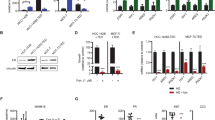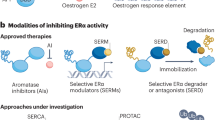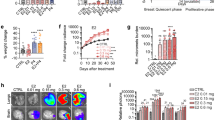Abstract
Transforming growth factor-beta 1 (TGF-beta 1) is inhibitory for breast epithelial cells in vitro and treatment of breast cancer cell lines with tamoxifen results in a rise in TGF-beta 1 mRNA expression with associated inhibition of cell growth. To study whether these findings apply in vivo we examined TGF-beta 1 mRNA expression in an oestrogen-dependent mouse xenograft system following systemic treatment of the mice with tamoxifen. In agreement with in vitro studies. TGF-beta 1 mRNA expression was sustained at high levels and associated with a reduction in tumour size. A subsequent study of breast tumour tissue from 56 patients demonstrated high levels of TGF-beta 1 mRNA in 45 of the tumours. High expression was found to correlate with premenopausal status, but not with tumour oestrogen receptor content or other parameters. In a subgroup of 11 patients who had received tamoxifen therapy for 3 to 6 months prior to surgery, unexpectedly high levels of TGF-beta 1 mRNA were demonstrated in tumours increasing in size and unresponsive to tamoxifen. Data from this study indicate that in patients with breast cancer, TGF-beta 1 in the tumour may not behave as in vitro and xenograft studies have suggested. We speculate that failure of tamoxifen therapy may be due to failure of the autocrine inhibitory functions of TGF-beta 1 either alone or in combination with paracrine stimulation of stromal cells or angiogenesis and localised immunosuppression. Further studies of active TGF-beta 1, TGF-beta receptors and the interactions with other growth factors will be required to elucidate the precise role of TGF-beta 1 in human breast cancer and in the failure of tamoxifen therapy.
This is a preview of subscription content, access via your institution
Access options
Subscribe to this journal
Receive 24 print issues and online access
$259.00 per year
only $10.79 per issue
Buy this article
- Purchase on Springer Link
- Instant access to full article PDF
Prices may be subject to local taxes which are calculated during checkout
Similar content being viewed by others
Author information
Authors and Affiliations
Rights and permissions
About this article
Cite this article
Thompson, A., Kerr, D. & Steel, C. Transforming growth factor β1 is implicated in the failure of tamoxifen therapy in human breast cancer. Br J Cancer 63, 609–614 (1991). https://doi.org/10.1038/bjc.1991.140
Issue Date:
DOI: https://doi.org/10.1038/bjc.1991.140
This article is cited by
-
“Iron-saturated” bovine lactoferrin improves the chemotherapeutic effects of tamoxifen in the treatment of basal-like breast cancer in mice
BMC Cancer (2012)
-
Transforming growth factor-β signaling: emerging stem cell target in metastatic breast cancer?
Breast Cancer Research and Treatment (2009)
-
Estrogen receptors inhibit Smad3 transcriptional activity through Ap-1 transcription factors
Molecular and Cellular Biochemistry (2007)
-
TGF-β signaling in tumor suppression and cancer progression
Nature Genetics (2001)



